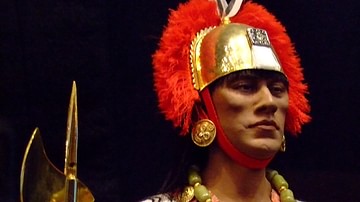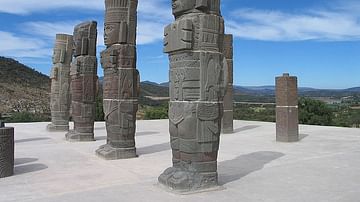Search
Did you mean: Tribune?
Search Results

Definition
Mali Empire
The Mali Empire (1240-1645) of West Africa was founded by Sundiata Keita (r. 1230-1255) following his victory over the kingdom of Sosso (c. 1180-1235). Sundiata's centralised government, diplomacy and well-trained army permitted a massive...

Definition
Songhai Empire
The Songhai Empire (aka Songhay, c. 1460 - c. 1591) covered what is today southern Mauritania and Mali. It replaced the Mali Empire (1240-1645) as the most important state in West Africa. Originating as a smaller kingdom along the eastern...

Definition
Inca Government
The centre of Inca power was the capital Cuzco, considered the navel of the world. 40,000 Incas governed an empire of over 10 million subjects who spoke over 30 different languages. Consequently, the centralised government employed a vast...

Definition
Ming Dynasty
The imperial Ming dynasty ruled China from 1368 to 1644. It replaced the Mongol Yuan dynasty which had been in power since the 13th century. Despite challenges from abroad and within, the Ming dynasty oversaw an unprecedented growth in China's...

Definition
Yahweh
Yahweh is the name of the state god of the ancient Kingdom of Israel and, later, the Kingdom of Judah. His name is composed of four Hebrew consonants (YHWH, known as the Tetragrammaton) which the prophet Moses is said to have revealed to...

Definition
Toltec Civilization
The Toltec civilization flourished in ancient central Mexico between the 10th and mid-12th centuries. Continuing the Mesoamerican heritage left to them by earlier cultures, the Toltecs built an impressive capital at Tollan. Ultimately, they...

Definition
Kingdom of Kongo
The Kingdom of Kongo (14-19th century CE) was located on the western coast of central Africa in modern-day DR of Congo and Angola. Prospering on the regional trade of copper, ivory, and slaves along the Congo River, the kingdom's wealth was...

Definition
Vasco da Gama
Vasco da Gama (c. 1469-1524) was a Portuguese navigator who, in 1497-9, sailed around the Cape of Good Hope in southern Africa and arrived at Calicut (now Kozhikode) on the south-west coast of India. This was the first direct voyage from...

Definition
New England Colonies
The New England Colonies were the settlements established by English religious dissenters along the coast of the north-east of North America between 1620-1640 CE. The original colonies were: - Plymouth Colony (1620 CE) - New Hampshire...

Definition
Tyrian Purple - The Super-Expensive Dye of Antiquity
Tyrian purple (aka Royal purple or Imperial purple) is a dye extracted from the murex shellfish which was first produced by the Phoenician city of Tyre in the Bronze Age. Its difficulty of manufacture, striking purple to red colour range...